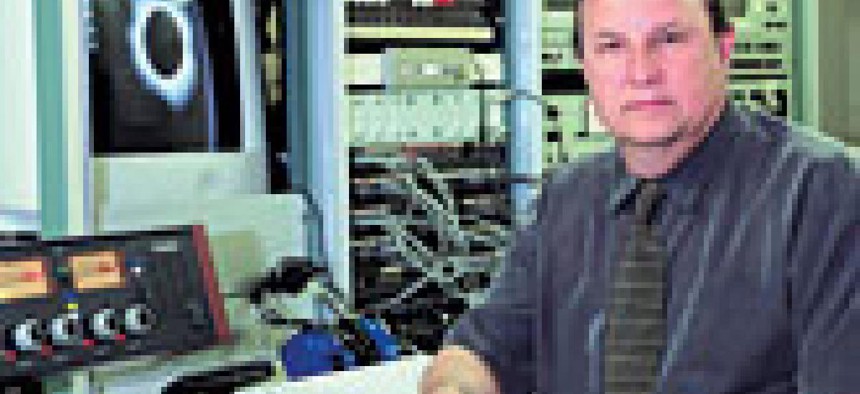When Lockwood Reed speaks, computers listen.Reed is project engineer of the interactive speech technology program for the Army's Communications-Electronics Command's Research, Development and Engineering Center (RDEC) at Fort Monmouth, N.J.He knows what he's talking about when it comes to speech recognition technology; he's been researching it for more than two decades.Reed's RDEC team is developing voice activation software for use in the nascent Force XXI Battle Command, Brigade and Below (FBCB2) system, the central component in the Army's future Battle Command Systems.FBCB2 uses ruggedized computers mounted in vehicles such as jeeps and tanks.The system represents network-centric warfare at its grittiest, operating amid the noise, frenzy and peril of the battlefield.'Digital messages are transferred between soldiers and command posts, sending information and receiving information,' Reed said.Using FBCB2, warfighters flash information such as the type of enemy equipment and locations to unit commanders, intelligence officers, artillery personnel and others. They in turn develop an overall picture of battlefield action and give commands and situational-awareness data back to warfighters.Although it's still being refined, the system has performed well in recent mock-battle scenarios and is considered deployable, an Army official said.In the current version, users enter information on their screens using a keyboard and pointing system. That's where Reed's speech recognition technology comes in.With voice-enhanced FBCB2, a user would be able to speak into the system instead of fiddling with a keyboard and pointer.'There are a lot of instances where you won't want to use a mouse or a keyboard,' he said. 'For example, during command on the move, the user can't afford to keep his eyes on the screen or needs to have his hands free to operate other controls.'But voice activation won't entirely replace keyboard input, he added: 'We're going to augment the technology. We see a hybrid approach where voice is just another input modality.'He illustrated the point with an example.A soldier moving across a battlefield in a tank enters information by voice. Once stopped, however, the soldier combines both voice and manual entry. For instance, to provide data on a location, the soldier simply moves the pointer to a coordinate on the computer screen rather than read the lengthy coordinate into the system. But once the cursor is on the coordinate, the soldier would go back to voice mode and say, 'Here.''We're using the best of both worlds,' Reed said. 'We're using the [pointer] to get to a specific location on the map, and we're using the word 'here' to mean 'pick up this coordinate.' 'The current technology also allows for fluctuations in combat noise levels.'For the equipment to maintain its level of performance, it can dynamically sample the noise environment and recalibrate itself as the environment changes,' he said.One of the complexities in designing speech recognition technology is making certain that the system understands words and phrases delivered by human voice.'A speech recognizer is not unlike a child,' Reed said. 'The child has to be taught a vocabulary and a grammar, or they're not going to understand you.'For battlefield technology, 'we have to devise a grammar that's best suited for the particular application. Then we build grammatically structured files so the system understands what the grammatical structure will be,' he explained.The current technology can interpret slight variations in the grammatical structure of simple utterances, Reed said.For instance, the system can understand the utterance 'Equipment type APC' (armored personnel carrier) and it can also understand truncated 'Equipment APC.''The problem comes with conversational speech,' Reed said. 'Conversational speech is not only ungrammatical, it also has pauses, hesitations and corrections. For example, a user might say, 'There are 30 armored vehicles heading northwest'make that north'moving fast. Send assault report now.' 'Current speech applications would have trouble processing such a sentence. But a human can process the phrase without even thinking about it, Reed said.It will take what Reed calls advanced cognitive interactive speech technology, or ASSIST, to build computers to process conversational speech.'I believe there are technologies out there that can achieve that kind of performance when integrated together,' he said. 'Everything depends on getting the funding for it.'With enough funding, ASSIST could see the light of day in four to five years, Reed said.Such visions are the product of Reed's more than 20 years of researching speech recognition technologies in Fort Monmouth labs.After earning a bachelor's degree in electrical engineering from the New Jersey Institute of Technology, he spent a year taking graduate courses in computer systems design. Reed then took a job at Fort Monmouth at what was then called the Electronics Command, where he researched communications systems and avionics.Around 1978, NASA's Ames Research Center assembled a governmentwide group, including the Electronics Command's research arm, to explore interactive voice systems.In due course, Reed began to spearhead RDEC's research in the field.'We started looking primarily at commercial [voice activation] technology to see if it would be applicable to the military environment,' he said. 'We wanted to get our feet wet, see what everybody was doing. We didn't want to reinvent the wheel, so we started there.'Reed's team eventually found that most commercial systems weren't suitable for military application, and they began to develop voice activation technologies from scratch.They built the current product from the ground up, Reed said.The FBCB2 program office is planning to integrate RDEC's tactical voice activation software into the system's next version'called Block 4'around the end of next year.But Reed is looking far beyond that to future applications as the technology matures.For example, future combat instruments will likely include an array of unmanned aerial and ground vehicles.'There is obviously a need to command and control those vehicles, and more advanced speech recognition would be needed to interact with them,' he said. 'I see robotic vehicle command and control as a natural for advanced speech recognition technology.'
RDEC's Lockwood Reed says, 'There are a lot of instances where you won't want to use a mouse or a keyboard.'




